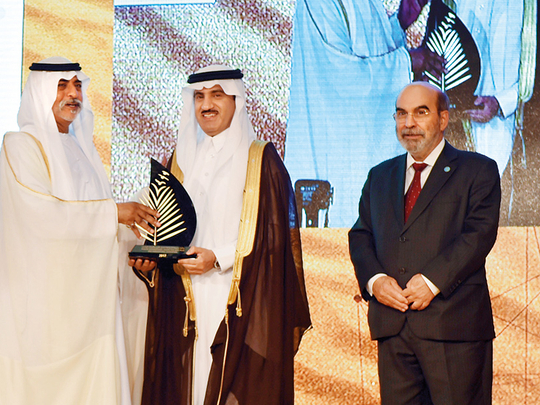
Abu Dhabi: The introduction of disease-causing microbes into date palms can combat the scourge of the red palm weevils, which destroy date palms and eat away at farmers’ livelihoods, a top researcher said in the capital on Monday.
These microbes effectively kill the red palm weevils while having no health risks for consumers, Dr Hussain Salama, Professor Emeritus at the National Research Centre of Cairo, told Gulf News,
“Red palm weevils are very dangerous pests, and can cause a healthy date palm to wilt and fall in just three months’ time. Traditional measures like insecticides have so far proved to be only partially effective, but have a harmful impact on the environment and consumers,” Dr Salama said.
“This is why the use of microbial agents is especially necessary, and it can be employed in conjunction with other pheromone and light traps. The method has only been in use for about two years, but has been very effective in comparison to traditional pest control techniques,” he added.
Dr Salama was speaking on the sidelines of the ninth session of the Khalifa International Award for Date Palm and Agricultural Innovation, which recognises contributions and innovation in the field of date palm agriculture. A total of Dh4.25 million was awarded on Monday to individuals and organisations in the region for their efforts in improving the health, productivity and status of dates and date palms. Dr Salama was felicitated as an ‘Influential Figure in the Field of Date Palm and Agricultural Innovation’.
“The agricultural sector has long played an important role in the lives of the people of the region, providing sustenance, building materials and shade. Given the recent challenges of drought and urban development, there is a renewed need to create new mechanisms to support and encourage innovation in the sector,” said Shaikh Nahyan Bin Mubarak Al Nahyan, UAE Minister for Culture and Knowledge Development.
Jose Da Silva, director-general of the United Nations Food and Agriculture Organisation, commended endeavours to tackle the red palm weevil, which is now also spreading to coconut trees and other palms.
The award itself was first established in 2007, as the UAE government identifies the development of the date palm industry as one of its strategic priorities. The country currently boasts more than 44 million date palms, representing nearly 98 per cent of all fruit trees in the UAE. The UAE is also among the 10 top date producers in the world.
This year, the Chair of Date Palm Research at Saudi Arabia’s King Saud University was awarded in the ‘Distinguished Innovation Studies and Modern Technology’ category. The Date Palm Research Centre of Excellence at Saudi Arabia’s King Faisal University was also chosen for ‘Distinguished Pioneering Development and Productive Projects’. Each winner received a certificate and a trophy, as well as Dh1 million.
Other award winners received Dh750,000 each, including Dr Salama, as well as Al Wathba Marionnet, which produces over 200,000 tissue culture date palms in Abu Dhabi and was recognised as a ‘Distinguished Producer in the Date Palm sector’. Mustafa Barami of Oman was selected for ‘Pioneering and Sophisticated Innovations Serving Agridulture’.
The award also recognised Her Highness Shaikha Fatima Bint Mubarak Al Nahyan, Mother of the Nation, as Personality of the Year for constantly encouraging the preservation of the environment while striking a balance with human needs.












